Literature Review: COVID-19's Psychological Impact on Healthcare Staff
VerifiedAdded on 2023/06/10
|15
|4318
|109
Literature Review
AI Summary
This narrative literature review explores the psychological impact of the COVID-19 pandemic on healthcare workers. It identifies issues such as depression, anxiety, and stress resulting from increased work pressure, lack of support, and fear of infection. The review analyzes existing research to highlight the challenges faced by frontline healthcare workers, including nurses, and discusses the need for interventions like counseling and administrative support to mitigate these mental health issues. The findings emphasize the urgent need for prioritizing the psychological well-being of healthcare workers to ensure quality care during and after public health crises. Desklib provides access to similar solved assignments.
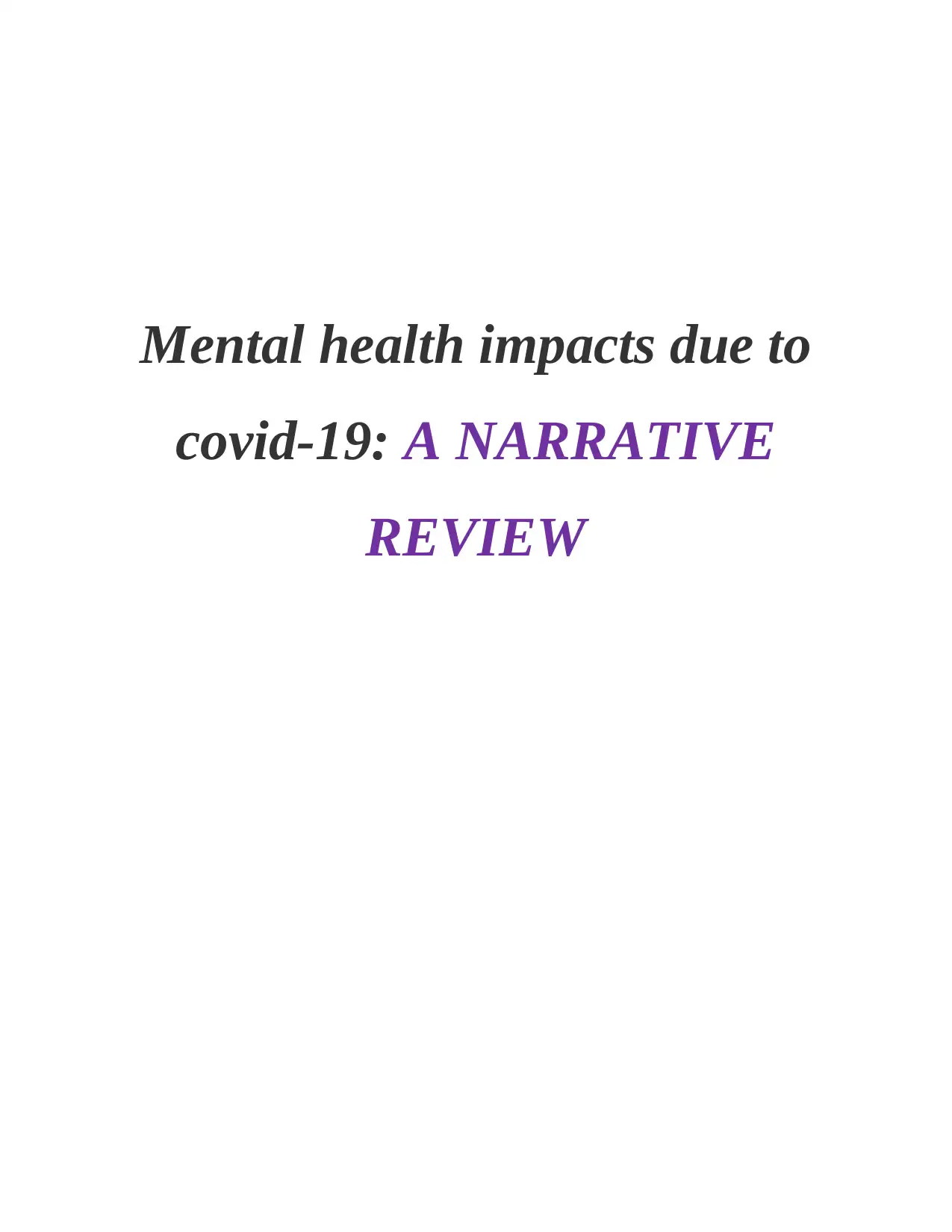
Mental health impacts due to
covid-19: A NARRATIVE
REVIEW
covid-19: A NARRATIVE
REVIEW
Paraphrase This Document
Need a fresh take? Get an instant paraphrase of this document with our AI Paraphraser


ABSTRACT
COVID-19 has created large number of emergencies in healthcare departments and healthcare
workers have shown their effective contribution in terms of dealing with the situation. However,
during COVID-19 a negative impact on the mental health of healthcare workers has occurred.
The major reason behind this was due to the increasing extent of their work pressure. The major
aim of literature review is to identify the psychological impact over the well-being of healthcare
workers during the time of COVID. The pandemic has influenced the mental health of
Healthcare workers which is being covered in the study. Comprehensive research has been and a
literature review has been performed in the context of this topic. The findings of the authors have
been analysed and a narrative review has been conducted using inclusion and exclusion criteria.
The major findings of the study have revealed that COVID-19 has created mental issues such as-
depression, anxiety and stress for healthcare workers that has impacted their quality of life and
work. The interventions that are needed for tackling a such situation in future are concerned with
counselling by healthcare administration and proper guidance for healthcare workers in terms of
managing such situations.
COVID-19 has created large number of emergencies in healthcare departments and healthcare
workers have shown their effective contribution in terms of dealing with the situation. However,
during COVID-19 a negative impact on the mental health of healthcare workers has occurred.
The major reason behind this was due to the increasing extent of their work pressure. The major
aim of literature review is to identify the psychological impact over the well-being of healthcare
workers during the time of COVID. The pandemic has influenced the mental health of
Healthcare workers which is being covered in the study. Comprehensive research has been and a
literature review has been performed in the context of this topic. The findings of the authors have
been analysed and a narrative review has been conducted using inclusion and exclusion criteria.
The major findings of the study have revealed that COVID-19 has created mental issues such as-
depression, anxiety and stress for healthcare workers that has impacted their quality of life and
work. The interventions that are needed for tackling a such situation in future are concerned with
counselling by healthcare administration and proper guidance for healthcare workers in terms of
managing such situations.
⊘ This is a preview!⊘
Do you want full access?
Subscribe today to unlock all pages.

Trusted by 1+ million students worldwide
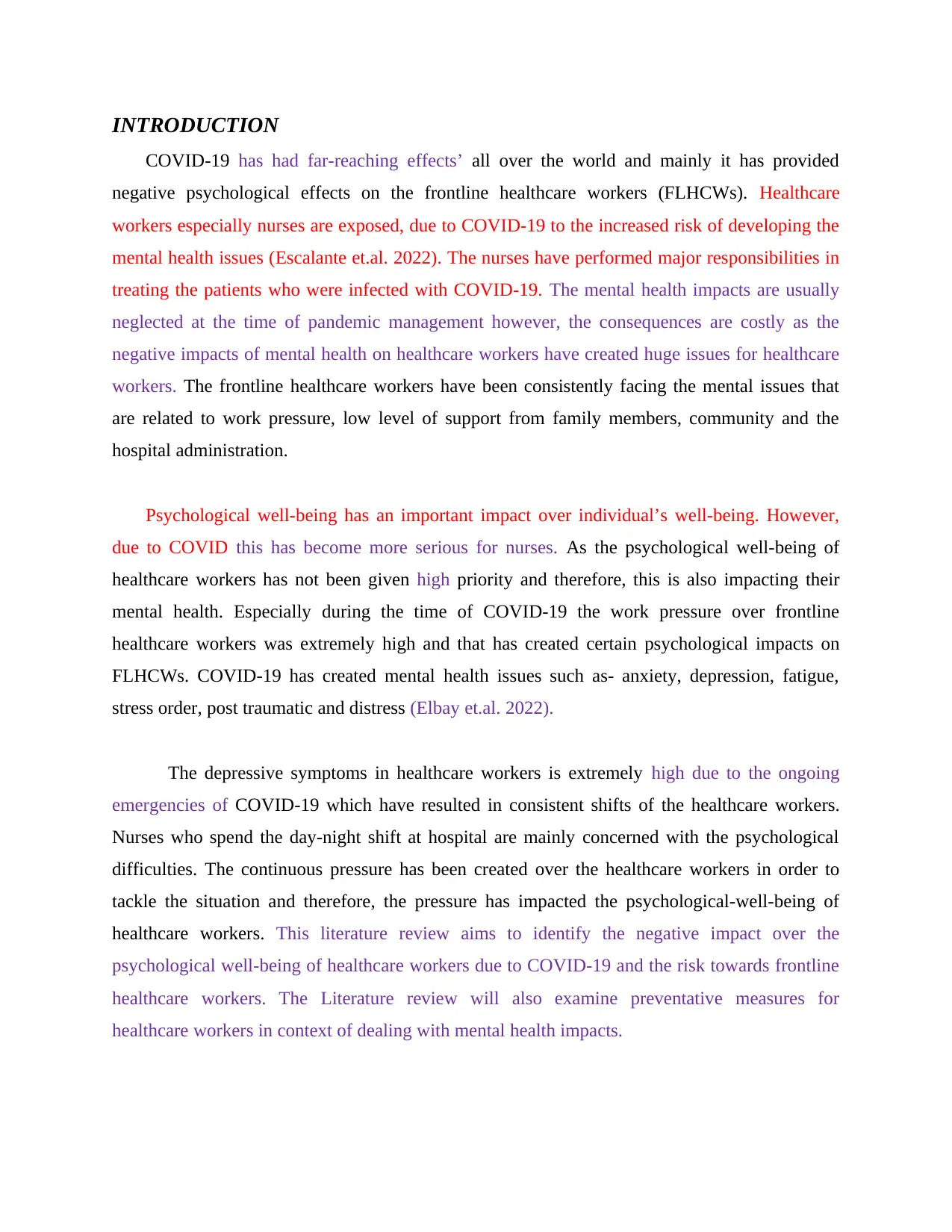
INTRODUCTION
COVID-19 has had far-reaching effects’ all over the world and mainly it has provided
negative psychological effects on the frontline healthcare workers (FLHCWs). Healthcare
workers especially nurses are exposed, due to COVID-19 to the increased risk of developing the
mental health issues (Escalante et.al. 2022). The nurses have performed major responsibilities in
treating the patients who were infected with COVID-19. The mental health impacts are usually
neglected at the time of pandemic management however, the consequences are costly as the
negative impacts of mental health on healthcare workers have created huge issues for healthcare
workers. The frontline healthcare workers have been consistently facing the mental issues that
are related to work pressure, low level of support from family members, community and the
hospital administration.
Psychological well-being has an important impact over individual’s well-being. However,
due to COVID this has become more serious for nurses. As the psychological well-being of
healthcare workers has not been given high priority and therefore, this is also impacting their
mental health. Especially during the time of COVID-19 the work pressure over frontline
healthcare workers was extremely high and that has created certain psychological impacts on
FLHCWs. COVID-19 has created mental health issues such as- anxiety, depression, fatigue,
stress order, post traumatic and distress (Elbay et.al. 2022).
The depressive symptoms in healthcare workers is extremely high due to the ongoing
emergencies of COVID-19 which have resulted in consistent shifts of the healthcare workers.
Nurses who spend the day-night shift at hospital are mainly concerned with the psychological
difficulties. The continuous pressure has been created over the healthcare workers in order to
tackle the situation and therefore, the pressure has impacted the psychological-well-being of
healthcare workers. This literature review aims to identify the negative impact over the
psychological well-being of healthcare workers due to COVID-19 and the risk towards frontline
healthcare workers. The Literature review will also examine preventative measures for
healthcare workers in context of dealing with mental health impacts.
COVID-19 has had far-reaching effects’ all over the world and mainly it has provided
negative psychological effects on the frontline healthcare workers (FLHCWs). Healthcare
workers especially nurses are exposed, due to COVID-19 to the increased risk of developing the
mental health issues (Escalante et.al. 2022). The nurses have performed major responsibilities in
treating the patients who were infected with COVID-19. The mental health impacts are usually
neglected at the time of pandemic management however, the consequences are costly as the
negative impacts of mental health on healthcare workers have created huge issues for healthcare
workers. The frontline healthcare workers have been consistently facing the mental issues that
are related to work pressure, low level of support from family members, community and the
hospital administration.
Psychological well-being has an important impact over individual’s well-being. However,
due to COVID this has become more serious for nurses. As the psychological well-being of
healthcare workers has not been given high priority and therefore, this is also impacting their
mental health. Especially during the time of COVID-19 the work pressure over frontline
healthcare workers was extremely high and that has created certain psychological impacts on
FLHCWs. COVID-19 has created mental health issues such as- anxiety, depression, fatigue,
stress order, post traumatic and distress (Elbay et.al. 2022).
The depressive symptoms in healthcare workers is extremely high due to the ongoing
emergencies of COVID-19 which have resulted in consistent shifts of the healthcare workers.
Nurses who spend the day-night shift at hospital are mainly concerned with the psychological
difficulties. The continuous pressure has been created over the healthcare workers in order to
tackle the situation and therefore, the pressure has impacted the psychological-well-being of
healthcare workers. This literature review aims to identify the negative impact over the
psychological well-being of healthcare workers due to COVID-19 and the risk towards frontline
healthcare workers. The Literature review will also examine preventative measures for
healthcare workers in context of dealing with mental health impacts.
Paraphrase This Document
Need a fresh take? Get an instant paraphrase of this document with our AI Paraphraser
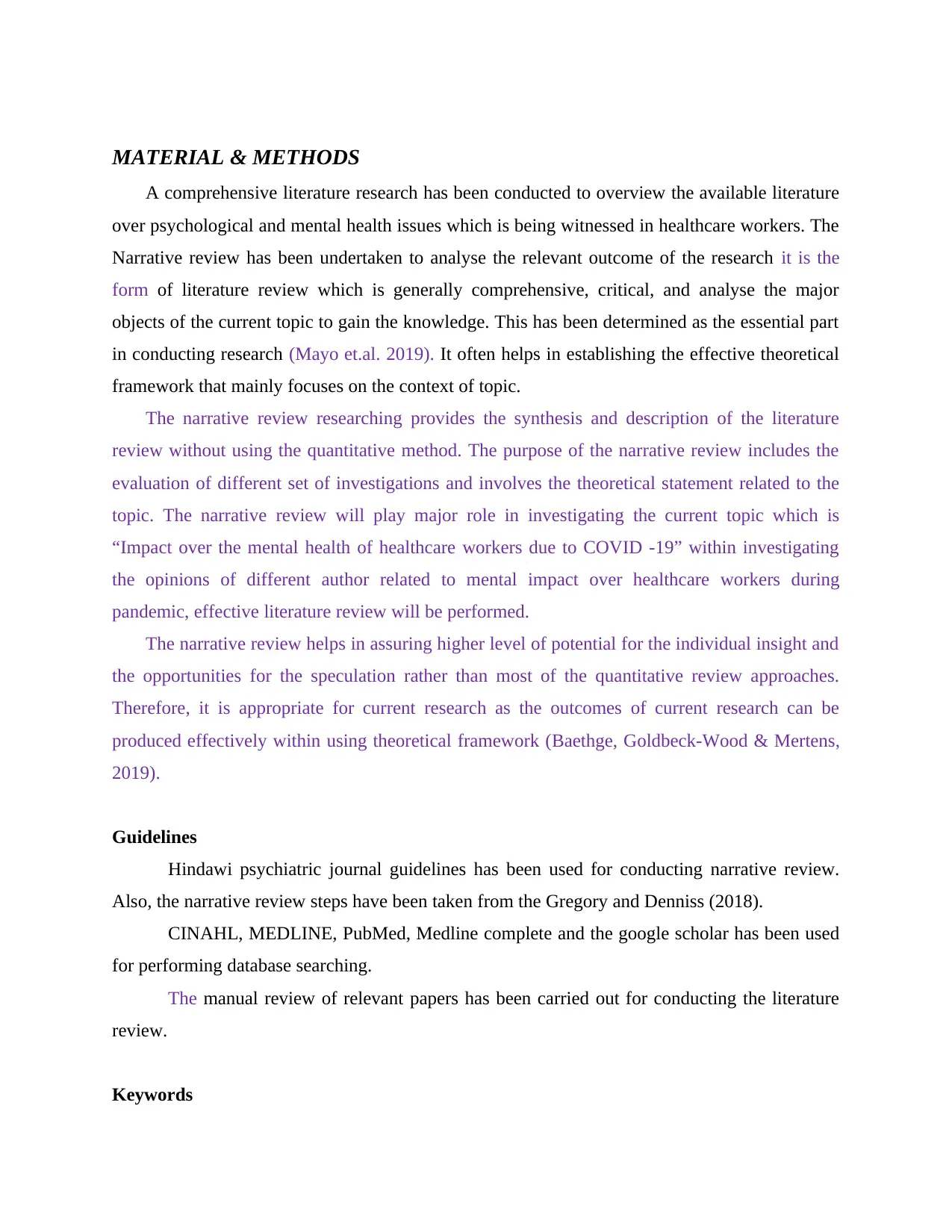
MATERIAL & METHODS
A comprehensive literature research has been conducted to overview the available literature
over psychological and mental health issues which is being witnessed in healthcare workers. The
Narrative review has been undertaken to analyse the relevant outcome of the research it is the
form of literature review which is generally comprehensive, critical, and analyse the major
objects of the current topic to gain the knowledge. This has been determined as the essential part
in conducting research (Mayo et.al. 2019). It often helps in establishing the effective theoretical
framework that mainly focuses on the context of topic.
The narrative review researching provides the synthesis and description of the literature
review without using the quantitative method. The purpose of the narrative review includes the
evaluation of different set of investigations and involves the theoretical statement related to the
topic. The narrative review will play major role in investigating the current topic which is
“Impact over the mental health of healthcare workers due to COVID -19” within investigating
the opinions of different author related to mental impact over healthcare workers during
pandemic, effective literature review will be performed.
The narrative review helps in assuring higher level of potential for the individual insight and
the opportunities for the speculation rather than most of the quantitative review approaches.
Therefore, it is appropriate for current research as the outcomes of current research can be
produced effectively within using theoretical framework (Baethge, Goldbeck-Wood & Mertens,
2019).
Guidelines
Hindawi psychiatric journal guidelines has been used for conducting narrative review.
Also, the narrative review steps have been taken from the Gregory and Denniss (2018).
CINAHL, MEDLINE, PubMed, Medline complete and the google scholar has been used
for performing database searching.
The manual review of relevant papers has been carried out for conducting the literature
review.
Keywords
A comprehensive literature research has been conducted to overview the available literature
over psychological and mental health issues which is being witnessed in healthcare workers. The
Narrative review has been undertaken to analyse the relevant outcome of the research it is the
form of literature review which is generally comprehensive, critical, and analyse the major
objects of the current topic to gain the knowledge. This has been determined as the essential part
in conducting research (Mayo et.al. 2019). It often helps in establishing the effective theoretical
framework that mainly focuses on the context of topic.
The narrative review researching provides the synthesis and description of the literature
review without using the quantitative method. The purpose of the narrative review includes the
evaluation of different set of investigations and involves the theoretical statement related to the
topic. The narrative review will play major role in investigating the current topic which is
“Impact over the mental health of healthcare workers due to COVID -19” within investigating
the opinions of different author related to mental impact over healthcare workers during
pandemic, effective literature review will be performed.
The narrative review helps in assuring higher level of potential for the individual insight and
the opportunities for the speculation rather than most of the quantitative review approaches.
Therefore, it is appropriate for current research as the outcomes of current research can be
produced effectively within using theoretical framework (Baethge, Goldbeck-Wood & Mertens,
2019).
Guidelines
Hindawi psychiatric journal guidelines has been used for conducting narrative review.
Also, the narrative review steps have been taken from the Gregory and Denniss (2018).
CINAHL, MEDLINE, PubMed, Medline complete and the google scholar has been used
for performing database searching.
The manual review of relevant papers has been carried out for conducting the literature
review.
Keywords
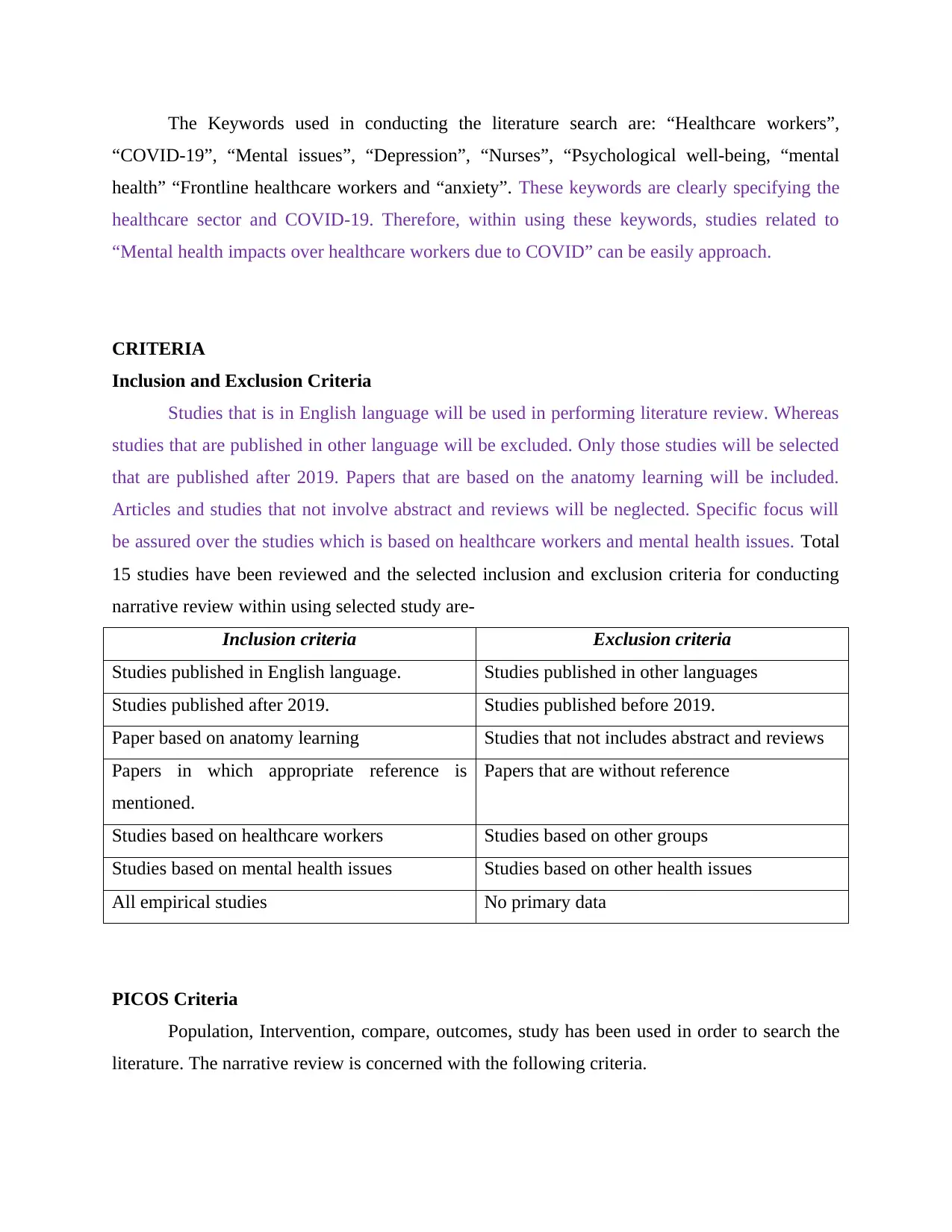
The Keywords used in conducting the literature search are: “Healthcare workers”,
“COVID-19”, “Mental issues”, “Depression”, “Nurses”, “Psychological well-being, “mental
health” “Frontline healthcare workers and “anxiety”. These keywords are clearly specifying the
healthcare sector and COVID-19. Therefore, within using these keywords, studies related to
“Mental health impacts over healthcare workers due to COVID” can be easily approach.
CRITERIA
Inclusion and Exclusion Criteria
Studies that is in English language will be used in performing literature review. Whereas
studies that are published in other language will be excluded. Only those studies will be selected
that are published after 2019. Papers that are based on the anatomy learning will be included.
Articles and studies that not involve abstract and reviews will be neglected. Specific focus will
be assured over the studies which is based on healthcare workers and mental health issues. Total
15 studies have been reviewed and the selected inclusion and exclusion criteria for conducting
narrative review within using selected study are-
Inclusion criteria Exclusion criteria
Studies published in English language. Studies published in other languages
Studies published after 2019. Studies published before 2019.
Paper based on anatomy learning Studies that not includes abstract and reviews
Papers in which appropriate reference is
mentioned.
Papers that are without reference
Studies based on healthcare workers Studies based on other groups
Studies based on mental health issues Studies based on other health issues
All empirical studies No primary data
PICOS Criteria
Population, Intervention, compare, outcomes, study has been used in order to search the
literature. The narrative review is concerned with the following criteria.
“COVID-19”, “Mental issues”, “Depression”, “Nurses”, “Psychological well-being, “mental
health” “Frontline healthcare workers and “anxiety”. These keywords are clearly specifying the
healthcare sector and COVID-19. Therefore, within using these keywords, studies related to
“Mental health impacts over healthcare workers due to COVID” can be easily approach.
CRITERIA
Inclusion and Exclusion Criteria
Studies that is in English language will be used in performing literature review. Whereas
studies that are published in other language will be excluded. Only those studies will be selected
that are published after 2019. Papers that are based on the anatomy learning will be included.
Articles and studies that not involve abstract and reviews will be neglected. Specific focus will
be assured over the studies which is based on healthcare workers and mental health issues. Total
15 studies have been reviewed and the selected inclusion and exclusion criteria for conducting
narrative review within using selected study are-
Inclusion criteria Exclusion criteria
Studies published in English language. Studies published in other languages
Studies published after 2019. Studies published before 2019.
Paper based on anatomy learning Studies that not includes abstract and reviews
Papers in which appropriate reference is
mentioned.
Papers that are without reference
Studies based on healthcare workers Studies based on other groups
Studies based on mental health issues Studies based on other health issues
All empirical studies No primary data
PICOS Criteria
Population, Intervention, compare, outcomes, study has been used in order to search the
literature. The narrative review is concerned with the following criteria.
⊘ This is a preview!⊘
Do you want full access?
Subscribe today to unlock all pages.

Trusted by 1+ million students worldwide
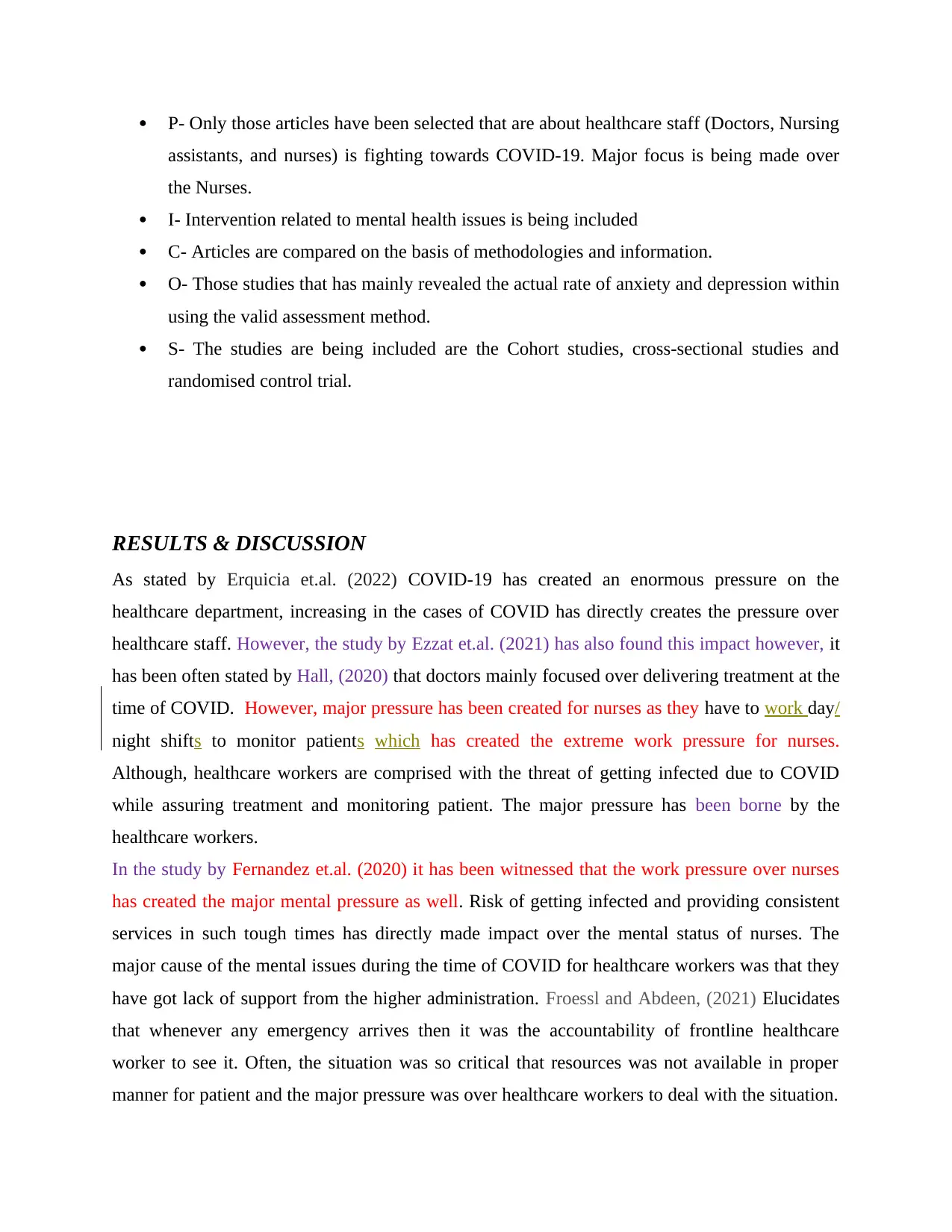
P- Only those articles have been selected that are about healthcare staff (Doctors, Nursing
assistants, and nurses) is fighting towards COVID-19. Major focus is being made over
the Nurses.
I- Intervention related to mental health issues is being included
C- Articles are compared on the basis of methodologies and information.
O- Those studies that has mainly revealed the actual rate of anxiety and depression within
using the valid assessment method.
S- The studies are being included are the Cohort studies, cross-sectional studies and
randomised control trial.
RESULTS & DISCUSSION
As stated by Erquicia et.al. (2022) COVID-19 has created an enormous pressure on the
healthcare department, increasing in the cases of COVID has directly creates the pressure over
healthcare staff. However, the study by Ezzat et.al. (2021) has also found this impact however, it
has been often stated by Hall, (2020) that doctors mainly focused over delivering treatment at the
time of COVID. However, major pressure has been created for nurses as they have to work day/
night shifts to monitor patients which has created the extreme work pressure for nurses.
Although, healthcare workers are comprised with the threat of getting infected due to COVID
while assuring treatment and monitoring patient. The major pressure has been borne by the
healthcare workers.
In the study by Fernandez et.al. (2020) it has been witnessed that the work pressure over nurses
has created the major mental pressure as well. Risk of getting infected and providing consistent
services in such tough times has directly made impact over the mental status of nurses. The
major cause of the mental issues during the time of COVID for healthcare workers was that they
have got lack of support from the higher administration. Froessl and Abdeen, (2021) Elucidates
that whenever any emergency arrives then it was the accountability of frontline healthcare
worker to see it. Often, the situation was so critical that resources was not available in proper
manner for patient and the major pressure was over healthcare workers to deal with the situation.
assistants, and nurses) is fighting towards COVID-19. Major focus is being made over
the Nurses.
I- Intervention related to mental health issues is being included
C- Articles are compared on the basis of methodologies and information.
O- Those studies that has mainly revealed the actual rate of anxiety and depression within
using the valid assessment method.
S- The studies are being included are the Cohort studies, cross-sectional studies and
randomised control trial.
RESULTS & DISCUSSION
As stated by Erquicia et.al. (2022) COVID-19 has created an enormous pressure on the
healthcare department, increasing in the cases of COVID has directly creates the pressure over
healthcare staff. However, the study by Ezzat et.al. (2021) has also found this impact however, it
has been often stated by Hall, (2020) that doctors mainly focused over delivering treatment at the
time of COVID. However, major pressure has been created for nurses as they have to work day/
night shifts to monitor patients which has created the extreme work pressure for nurses.
Although, healthcare workers are comprised with the threat of getting infected due to COVID
while assuring treatment and monitoring patient. The major pressure has been borne by the
healthcare workers.
In the study by Fernandez et.al. (2020) it has been witnessed that the work pressure over nurses
has created the major mental pressure as well. Risk of getting infected and providing consistent
services in such tough times has directly made impact over the mental status of nurses. The
major cause of the mental issues during the time of COVID for healthcare workers was that they
have got lack of support from the higher administration. Froessl and Abdeen, (2021) Elucidates
that whenever any emergency arrives then it was the accountability of frontline healthcare
worker to see it. Often, the situation was so critical that resources was not available in proper
manner for patient and the major pressure was over healthcare workers to deal with the situation.
Paraphrase This Document
Need a fresh take? Get an instant paraphrase of this document with our AI Paraphraser
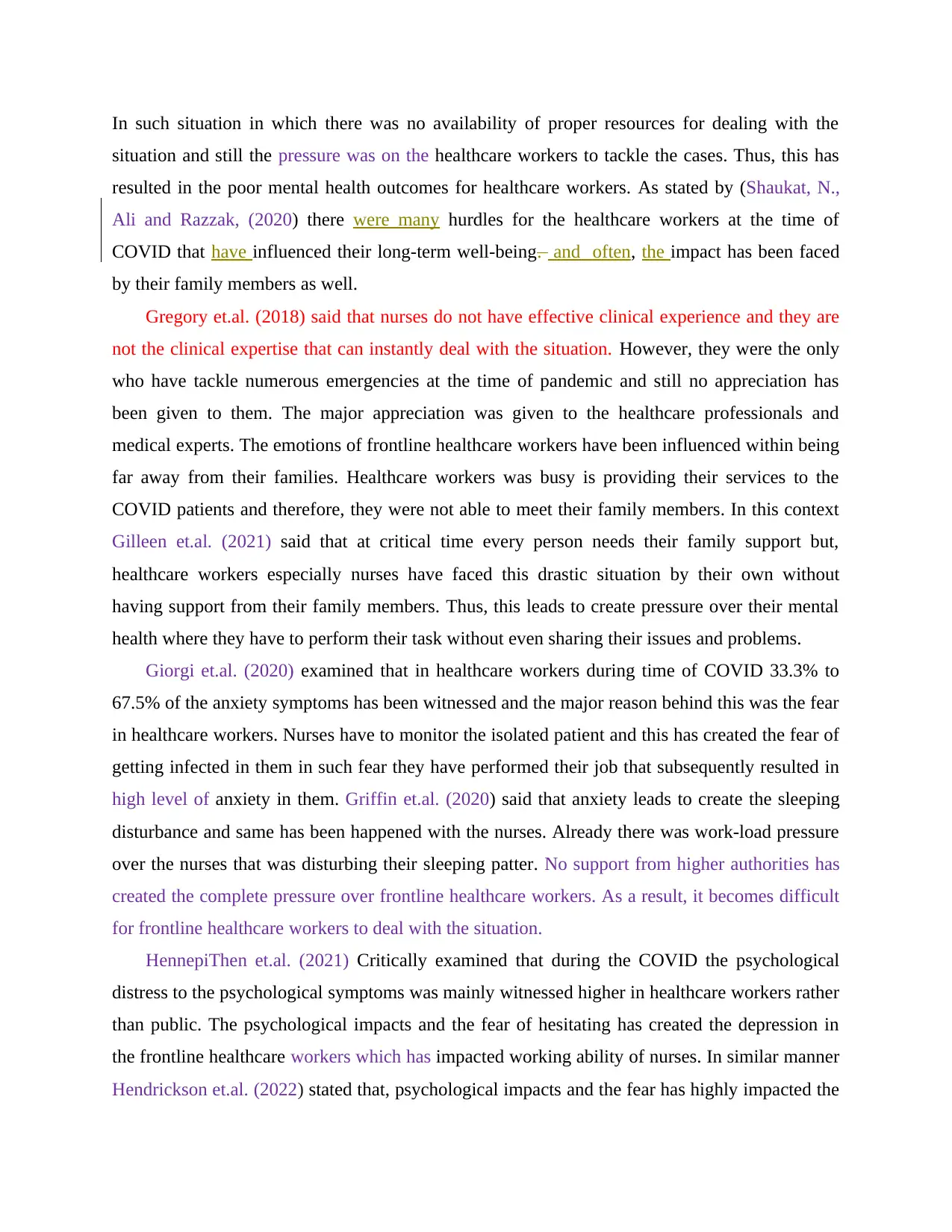
In such situation in which there was no availability of proper resources for dealing with the
situation and still the pressure was on the healthcare workers to tackle the cases. Thus, this has
resulted in the poor mental health outcomes for healthcare workers. As stated by (Shaukat, N.,
Ali and Razzak, (2020) there were many hurdles for the healthcare workers at the time of
COVID that have influenced their long-term well-being. and often, the impact has been faced
by their family members as well.
Gregory et.al. (2018) said that nurses do not have effective clinical experience and they are
not the clinical expertise that can instantly deal with the situation. However, they were the only
who have tackle numerous emergencies at the time of pandemic and still no appreciation has
been given to them. The major appreciation was given to the healthcare professionals and
medical experts. The emotions of frontline healthcare workers have been influenced within being
far away from their families. Healthcare workers was busy is providing their services to the
COVID patients and therefore, they were not able to meet their family members. In this context
Gilleen et.al. (2021) said that at critical time every person needs their family support but,
healthcare workers especially nurses have faced this drastic situation by their own without
having support from their family members. Thus, this leads to create pressure over their mental
health where they have to perform their task without even sharing their issues and problems.
Giorgi et.al. (2020) examined that in healthcare workers during time of COVID 33.3% to
67.5% of the anxiety symptoms has been witnessed and the major reason behind this was the fear
in healthcare workers. Nurses have to monitor the isolated patient and this has created the fear of
getting infected in them in such fear they have performed their job that subsequently resulted in
high level of anxiety in them. Griffin et.al. (2020) said that anxiety leads to create the sleeping
disturbance and same has been happened with the nurses. Already there was work-load pressure
over the nurses that was disturbing their sleeping patter. No support from higher authorities has
created the complete pressure over frontline healthcare workers. As a result, it becomes difficult
for frontline healthcare workers to deal with the situation.
HennepiThen et.al. (2021) Critically examined that during the COVID the psychological
distress to the psychological symptoms was mainly witnessed higher in healthcare workers rather
than public. The psychological impacts and the fear of hesitating has created the depression in
the frontline healthcare workers which has impacted working ability of nurses. In similar manner
Hendrickson et.al. (2022) stated that, psychological impacts and the fear has highly impacted the
situation and still the pressure was on the healthcare workers to tackle the cases. Thus, this has
resulted in the poor mental health outcomes for healthcare workers. As stated by (Shaukat, N.,
Ali and Razzak, (2020) there were many hurdles for the healthcare workers at the time of
COVID that have influenced their long-term well-being. and often, the impact has been faced
by their family members as well.
Gregory et.al. (2018) said that nurses do not have effective clinical experience and they are
not the clinical expertise that can instantly deal with the situation. However, they were the only
who have tackle numerous emergencies at the time of pandemic and still no appreciation has
been given to them. The major appreciation was given to the healthcare professionals and
medical experts. The emotions of frontline healthcare workers have been influenced within being
far away from their families. Healthcare workers was busy is providing their services to the
COVID patients and therefore, they were not able to meet their family members. In this context
Gilleen et.al. (2021) said that at critical time every person needs their family support but,
healthcare workers especially nurses have faced this drastic situation by their own without
having support from their family members. Thus, this leads to create pressure over their mental
health where they have to perform their task without even sharing their issues and problems.
Giorgi et.al. (2020) examined that in healthcare workers during time of COVID 33.3% to
67.5% of the anxiety symptoms has been witnessed and the major reason behind this was the fear
in healthcare workers. Nurses have to monitor the isolated patient and this has created the fear of
getting infected in them in such fear they have performed their job that subsequently resulted in
high level of anxiety in them. Griffin et.al. (2020) said that anxiety leads to create the sleeping
disturbance and same has been happened with the nurses. Already there was work-load pressure
over the nurses that was disturbing their sleeping patter. No support from higher authorities has
created the complete pressure over frontline healthcare workers. As a result, it becomes difficult
for frontline healthcare workers to deal with the situation.
HennepiThen et.al. (2021) Critically examined that during the COVID the psychological
distress to the psychological symptoms was mainly witnessed higher in healthcare workers rather
than public. The psychological impacts and the fear of hesitating has created the depression in
the frontline healthcare workers which has impacted working ability of nurses. In similar manner
Hendrickson et.al. (2022) stated that, psychological impacts and the fear has highly impacted the
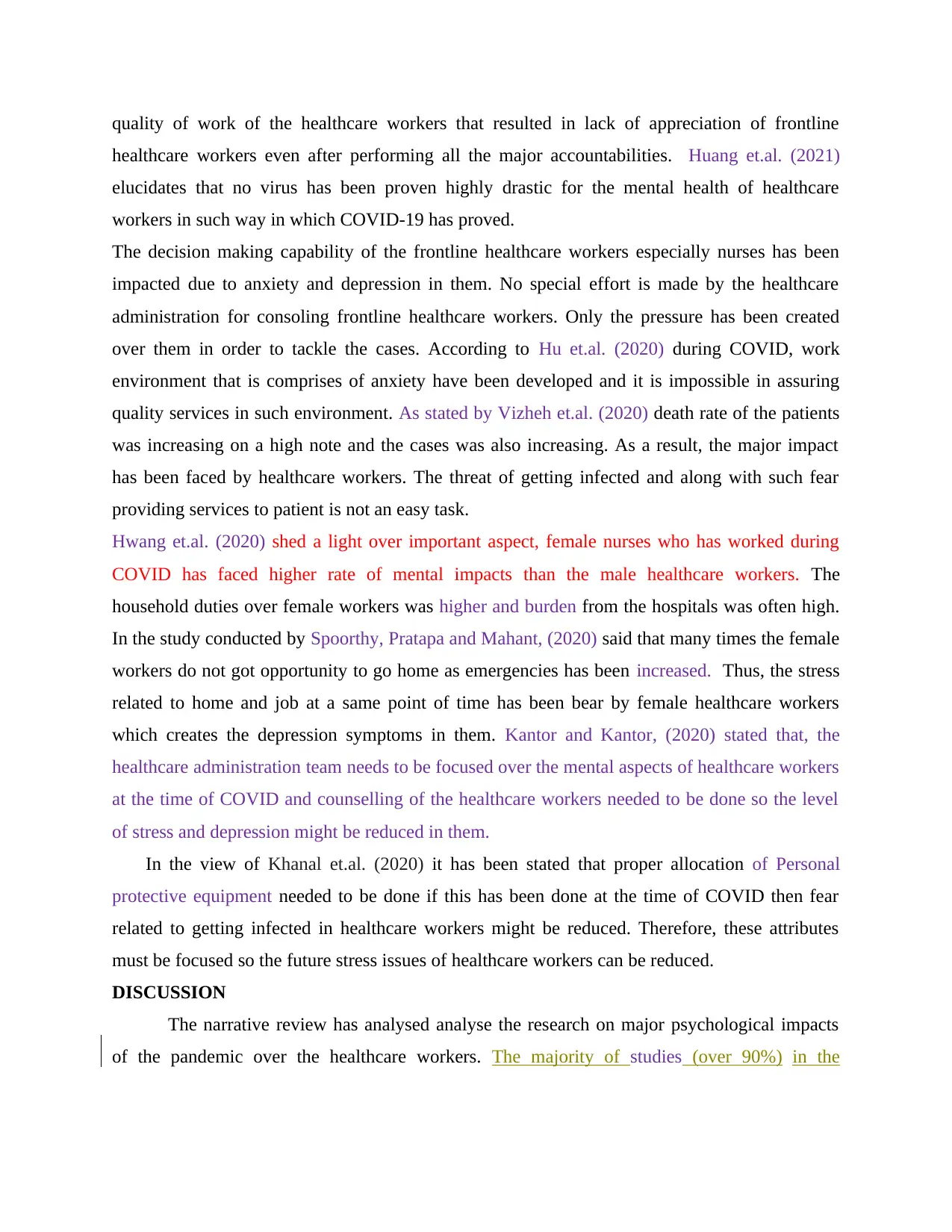
quality of work of the healthcare workers that resulted in lack of appreciation of frontline
healthcare workers even after performing all the major accountabilities. Huang et.al. (2021)
elucidates that no virus has been proven highly drastic for the mental health of healthcare
workers in such way in which COVID-19 has proved.
The decision making capability of the frontline healthcare workers especially nurses has been
impacted due to anxiety and depression in them. No special effort is made by the healthcare
administration for consoling frontline healthcare workers. Only the pressure has been created
over them in order to tackle the cases. According to Hu et.al. (2020) during COVID, work
environment that is comprises of anxiety have been developed and it is impossible in assuring
quality services in such environment. As stated by Vizheh et.al. (2020) death rate of the patients
was increasing on a high note and the cases was also increasing. As a result, the major impact
has been faced by healthcare workers. The threat of getting infected and along with such fear
providing services to patient is not an easy task.
Hwang et.al. (2020) shed a light over important aspect, female nurses who has worked during
COVID has faced higher rate of mental impacts than the male healthcare workers. The
household duties over female workers was higher and burden from the hospitals was often high.
In the study conducted by Spoorthy, Pratapa and Mahant, (2020) said that many times the female
workers do not got opportunity to go home as emergencies has been increased. Thus, the stress
related to home and job at a same point of time has been bear by female healthcare workers
which creates the depression symptoms in them. Kantor and Kantor, (2020) stated that, the
healthcare administration team needs to be focused over the mental aspects of healthcare workers
at the time of COVID and counselling of the healthcare workers needed to be done so the level
of stress and depression might be reduced in them.
In the view of Khanal et.al. (2020) it has been stated that proper allocation of Personal
protective equipment needed to be done if this has been done at the time of COVID then fear
related to getting infected in healthcare workers might be reduced. Therefore, these attributes
must be focused so the future stress issues of healthcare workers can be reduced.
DISCUSSION
The narrative review has analysed analyse the research on major psychological impacts
of the pandemic over the healthcare workers. The majority of studies (over 90%) in the
healthcare workers even after performing all the major accountabilities. Huang et.al. (2021)
elucidates that no virus has been proven highly drastic for the mental health of healthcare
workers in such way in which COVID-19 has proved.
The decision making capability of the frontline healthcare workers especially nurses has been
impacted due to anxiety and depression in them. No special effort is made by the healthcare
administration for consoling frontline healthcare workers. Only the pressure has been created
over them in order to tackle the cases. According to Hu et.al. (2020) during COVID, work
environment that is comprises of anxiety have been developed and it is impossible in assuring
quality services in such environment. As stated by Vizheh et.al. (2020) death rate of the patients
was increasing on a high note and the cases was also increasing. As a result, the major impact
has been faced by healthcare workers. The threat of getting infected and along with such fear
providing services to patient is not an easy task.
Hwang et.al. (2020) shed a light over important aspect, female nurses who has worked during
COVID has faced higher rate of mental impacts than the male healthcare workers. The
household duties over female workers was higher and burden from the hospitals was often high.
In the study conducted by Spoorthy, Pratapa and Mahant, (2020) said that many times the female
workers do not got opportunity to go home as emergencies has been increased. Thus, the stress
related to home and job at a same point of time has been bear by female healthcare workers
which creates the depression symptoms in them. Kantor and Kantor, (2020) stated that, the
healthcare administration team needs to be focused over the mental aspects of healthcare workers
at the time of COVID and counselling of the healthcare workers needed to be done so the level
of stress and depression might be reduced in them.
In the view of Khanal et.al. (2020) it has been stated that proper allocation of Personal
protective equipment needed to be done if this has been done at the time of COVID then fear
related to getting infected in healthcare workers might be reduced. Therefore, these attributes
must be focused so the future stress issues of healthcare workers can be reduced.
DISCUSSION
The narrative review has analysed analyse the research on major psychological impacts
of the pandemic over the healthcare workers. The majority of studies (over 90%) in the
⊘ This is a preview!⊘
Do you want full access?
Subscribe today to unlock all pages.

Trusted by 1+ million students worldwide
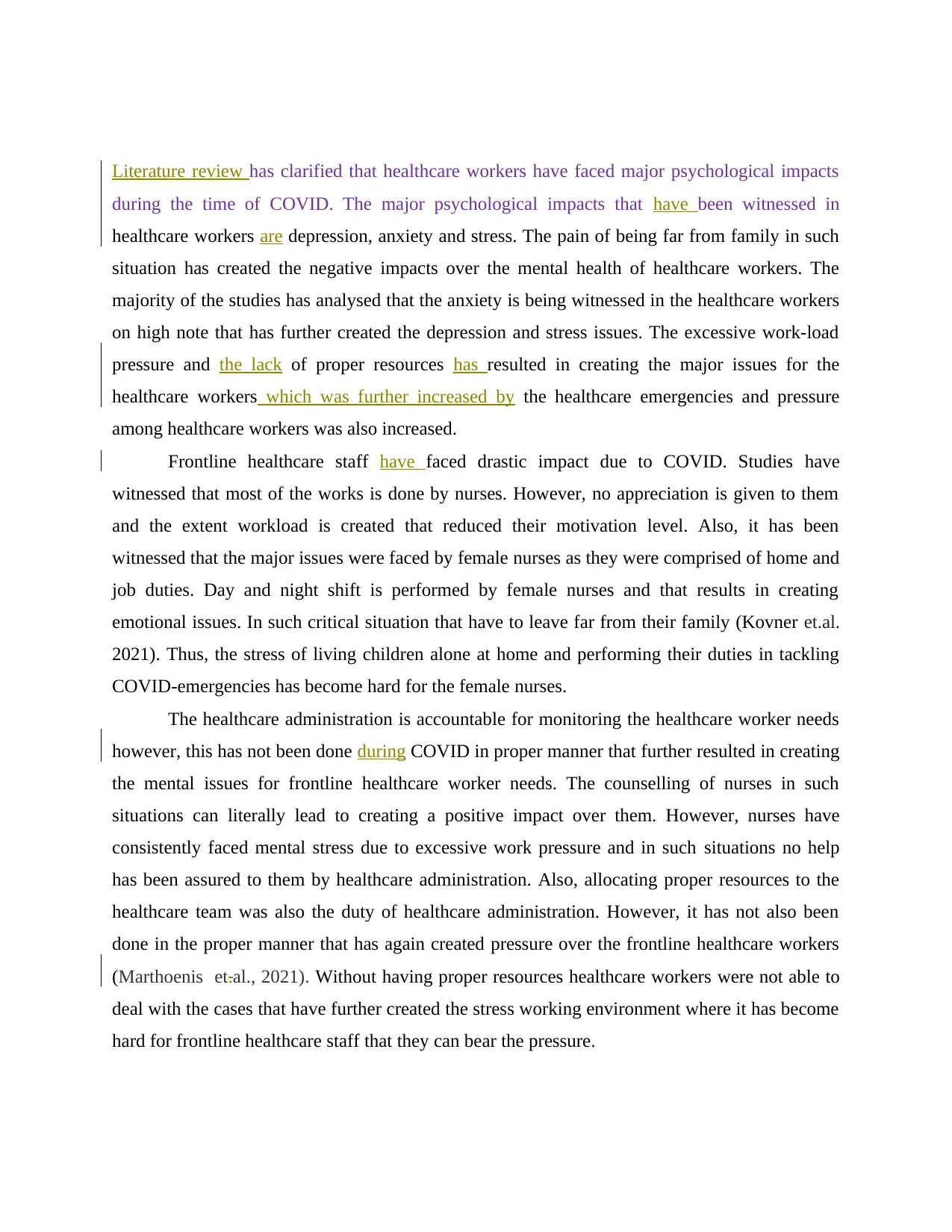
Literature review has clarified that healthcare workers have faced major psychological impacts
during the time of COVID. The major psychological impacts that have been witnessed in
healthcare workers are depression, anxiety and stress. The pain of being far from family in such
situation has created the negative impacts over the mental health of healthcare workers. The
majority of the studies has analysed that the anxiety is being witnessed in the healthcare workers
on high note that has further created the depression and stress issues. The excessive work-load
pressure and the lack of proper resources has resulted in creating the major issues for the
healthcare workers which was further increased by the healthcare emergencies and pressure
among healthcare workers was also increased.
Frontline healthcare staff have faced drastic impact due to COVID. Studies have
witnessed that most of the works is done by nurses. However, no appreciation is given to them
and the extent workload is created that reduced their motivation level. Also, it has been
witnessed that the major issues were faced by female nurses as they were comprised of home and
job duties. Day and night shift is performed by female nurses and that results in creating
emotional issues. In such critical situation that have to leave far from their family (Kovner et.al.
2021). Thus, the stress of living children alone at home and performing their duties in tackling
COVID-emergencies has become hard for the female nurses.
The healthcare administration is accountable for monitoring the healthcare worker needs
however, this has not been done during COVID in proper manner that further resulted in creating
the mental issues for frontline healthcare worker needs. The counselling of nurses in such
situations can literally lead to creating a positive impact over them. However, nurses have
consistently faced mental stress due to excessive work pressure and in such situations no help
has been assured to them by healthcare administration. Also, allocating proper resources to the
healthcare team was also the duty of healthcare administration. However, it has not also been
done in the proper manner that has again created pressure over the frontline healthcare workers
(Marthoenis et.al., 2021). Without having proper resources healthcare workers were not able to
deal with the cases that have further created the stress working environment where it has become
hard for frontline healthcare staff that they can bear the pressure.
during the time of COVID. The major psychological impacts that have been witnessed in
healthcare workers are depression, anxiety and stress. The pain of being far from family in such
situation has created the negative impacts over the mental health of healthcare workers. The
majority of the studies has analysed that the anxiety is being witnessed in the healthcare workers
on high note that has further created the depression and stress issues. The excessive work-load
pressure and the lack of proper resources has resulted in creating the major issues for the
healthcare workers which was further increased by the healthcare emergencies and pressure
among healthcare workers was also increased.
Frontline healthcare staff have faced drastic impact due to COVID. Studies have
witnessed that most of the works is done by nurses. However, no appreciation is given to them
and the extent workload is created that reduced their motivation level. Also, it has been
witnessed that the major issues were faced by female nurses as they were comprised of home and
job duties. Day and night shift is performed by female nurses and that results in creating
emotional issues. In such critical situation that have to leave far from their family (Kovner et.al.
2021). Thus, the stress of living children alone at home and performing their duties in tackling
COVID-emergencies has become hard for the female nurses.
The healthcare administration is accountable for monitoring the healthcare worker needs
however, this has not been done during COVID in proper manner that further resulted in creating
the mental issues for frontline healthcare worker needs. The counselling of nurses in such
situations can literally lead to creating a positive impact over them. However, nurses have
consistently faced mental stress due to excessive work pressure and in such situations no help
has been assured to them by healthcare administration. Also, allocating proper resources to the
healthcare team was also the duty of healthcare administration. However, it has not also been
done in the proper manner that has again created pressure over the frontline healthcare workers
(Marthoenis et.al., 2021). Without having proper resources healthcare workers were not able to
deal with the cases that have further created the stress working environment where it has become
hard for frontline healthcare staff that they can bear the pressure.
Paraphrase This Document
Need a fresh take? Get an instant paraphrase of this document with our AI Paraphraser
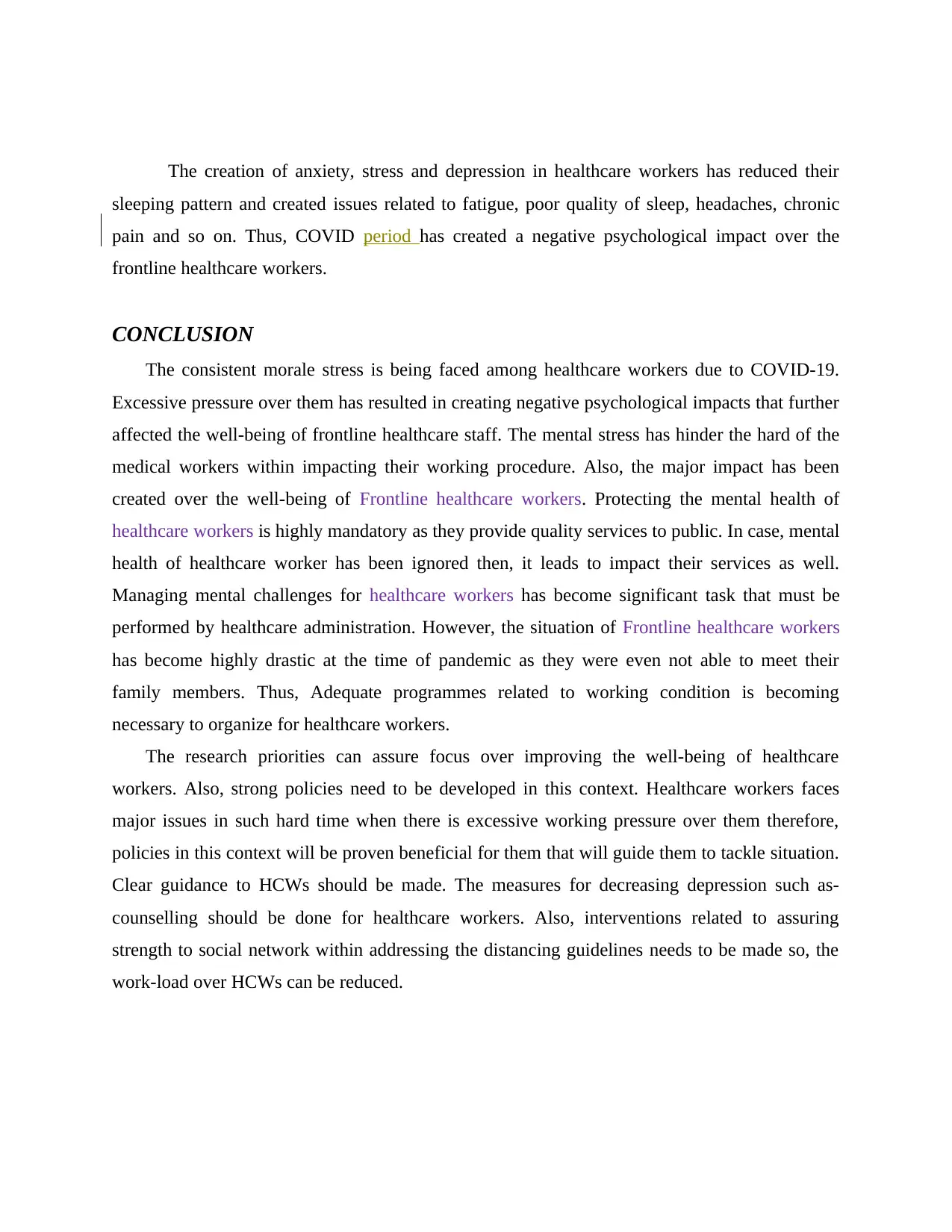
The creation of anxiety, stress and depression in healthcare workers has reduced their
sleeping pattern and created issues related to fatigue, poor quality of sleep, headaches, chronic
pain and so on. Thus, COVID period has created a negative psychological impact over the
frontline healthcare workers.
CONCLUSION
The consistent morale stress is being faced among healthcare workers due to COVID-19.
Excessive pressure over them has resulted in creating negative psychological impacts that further
affected the well-being of frontline healthcare staff. The mental stress has hinder the hard of the
medical workers within impacting their working procedure. Also, the major impact has been
created over the well-being of Frontline healthcare workers. Protecting the mental health of
healthcare workers is highly mandatory as they provide quality services to public. In case, mental
health of healthcare worker has been ignored then, it leads to impact their services as well.
Managing mental challenges for healthcare workers has become significant task that must be
performed by healthcare administration. However, the situation of Frontline healthcare workers
has become highly drastic at the time of pandemic as they were even not able to meet their
family members. Thus, Adequate programmes related to working condition is becoming
necessary to organize for healthcare workers.
The research priorities can assure focus over improving the well-being of healthcare
workers. Also, strong policies need to be developed in this context. Healthcare workers faces
major issues in such hard time when there is excessive working pressure over them therefore,
policies in this context will be proven beneficial for them that will guide them to tackle situation.
Clear guidance to HCWs should be made. The measures for decreasing depression such as-
counselling should be done for healthcare workers. Also, interventions related to assuring
strength to social network within addressing the distancing guidelines needs to be made so, the
work-load over HCWs can be reduced.
sleeping pattern and created issues related to fatigue, poor quality of sleep, headaches, chronic
pain and so on. Thus, COVID period has created a negative psychological impact over the
frontline healthcare workers.
CONCLUSION
The consistent morale stress is being faced among healthcare workers due to COVID-19.
Excessive pressure over them has resulted in creating negative psychological impacts that further
affected the well-being of frontline healthcare staff. The mental stress has hinder the hard of the
medical workers within impacting their working procedure. Also, the major impact has been
created over the well-being of Frontline healthcare workers. Protecting the mental health of
healthcare workers is highly mandatory as they provide quality services to public. In case, mental
health of healthcare worker has been ignored then, it leads to impact their services as well.
Managing mental challenges for healthcare workers has become significant task that must be
performed by healthcare administration. However, the situation of Frontline healthcare workers
has become highly drastic at the time of pandemic as they were even not able to meet their
family members. Thus, Adequate programmes related to working condition is becoming
necessary to organize for healthcare workers.
The research priorities can assure focus over improving the well-being of healthcare
workers. Also, strong policies need to be developed in this context. Healthcare workers faces
major issues in such hard time when there is excessive working pressure over them therefore,
policies in this context will be proven beneficial for them that will guide them to tackle situation.
Clear guidance to HCWs should be made. The measures for decreasing depression such as-
counselling should be done for healthcare workers. Also, interventions related to assuring
strength to social network within addressing the distancing guidelines needs to be made so, the
work-load over HCWs can be reduced.
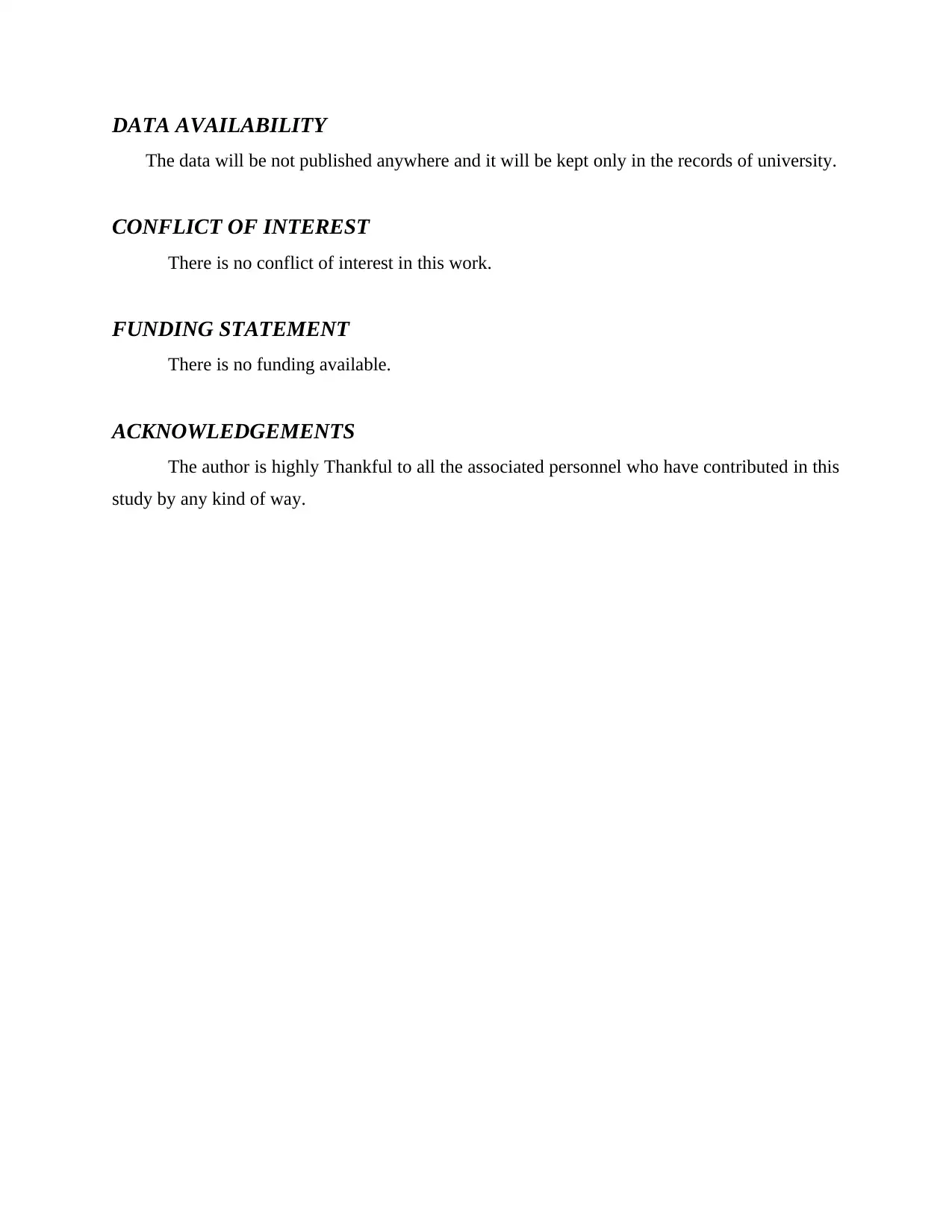
DATA AVAILABILITY
The data will be not published anywhere and it will be kept only in the records of university.
CONFLICT OF INTEREST
There is no conflict of interest in this work.
FUNDING STATEMENT
There is no funding available.
ACKNOWLEDGEMENTS
The author is highly Thankful to all the associated personnel who have contributed in this
study by any kind of way.
The data will be not published anywhere and it will be kept only in the records of university.
CONFLICT OF INTEREST
There is no conflict of interest in this work.
FUNDING STATEMENT
There is no funding available.
ACKNOWLEDGEMENTS
The author is highly Thankful to all the associated personnel who have contributed in this
study by any kind of way.
⊘ This is a preview!⊘
Do you want full access?
Subscribe today to unlock all pages.

Trusted by 1+ million students worldwide
1 out of 15
Related Documents
Your All-in-One AI-Powered Toolkit for Academic Success.
+13062052269
info@desklib.com
Available 24*7 on WhatsApp / Email
![[object Object]](/_next/static/media/star-bottom.7253800d.svg)
Unlock your academic potential
Copyright © 2020–2026 A2Z Services. All Rights Reserved. Developed and managed by ZUCOL.




